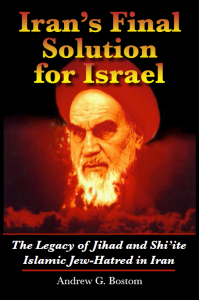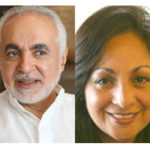By Alyssa A. Lappen
Pajamas Media | May 12, 2014
 A review of Andrew Bostom’s Iran’s Final Solution for Israel: The Legacy of Islamic Jihad and Shi’ite Islamic Jew-Hatred in Iran.
A review of Andrew Bostom’s Iran’s Final Solution for Israel: The Legacy of Islamic Jihad and Shi’ite Islamic Jew-Hatred in Iran.
Dr. Andrew Bostom closes the preface to his new volume, Iran’s Final Solution for Israel: The Legacy of Islamic Jihad and Shi’ite Islamic Jew-Hatred in Iran, with several rhetorical questions, answered encyclopedically in the chapters that follow.
At first glance, someone unfamiliar with the nature of the subject might recognize in them a resemblance to Jeopardy!, now in its 30th year. Jeopardy contestants must correctly identify the historical event, leader or trivia — in the form of a question. To a description, for example, of “totalitarian religious law dictating behavior in all aspects of life for persons of said faith,” a well-tutored college student might ask: “What is sharia?” Of a treaty signed in March 628 between a famous charismatic figure and military commander and a competing Arabian tribe, a brainy homemaker might respond: “What is the Treaty of Hudaybiyyah?”
However, few Westerners can actually provide these correct responses, an issue that puts Western society in grave jeopardy.
Only the near-universal ignorance on Islam could explain why the Western press corps and leaders of the so-called “P5 +1” nations — the five permanent members of the United Nations Security Council plus Iran — all naïvely lauded the late November 2013 news of an interim agreement to eliminate Iran’s ability to produce nuclear weapons, and blindly accepted the notion that the deal would halt Iran’s future military goals.
Actually, the opposite happened. The P5 leaders, hopeful that a written agreement could put Iran’s nuclear ambitions to rest, were all-too-easily duped by Iran.
This reality marched to the fore on February 11, 2014, when Iranians massed in the streets of Tehran shouting “down with the U.S.” and “death to Israel” to celebrate the 35th anniversary of the 1979 Islamic revolution, during which Ayatollah Rehollah Khomeini reestablished the Iranian Shiite theocracy that the 20th century Pahlavi shahs had forestalled for an all-too-brief 54-year juncture (1925-1979).
As if to punctuate the madness of any attempt to reach agreement, current Iranian president Hassan Rouhani that day stated that the country’s nuclear program would continue “forever,” and that all Western sanctions to stop it had been “brutal, illegal, and wrong.”
Meanwhile, three Iranian military leaders simultaneously celebrated the milestone anniversary with “in your face” bellicosity. Major-General Yahya Rahim Safavi, a senior military aide to Iranian Supreme Leader Ayatollah Ali Khamenei, promised that “Hezbollah forces of Iran and the Lebanese Hezbollah” would counter any Israeli attempt to halt Iran’s nuclear weapons program that would, just as the nuclear program is intended to do, destroy “the Zionist regime.” Iranian Defense Minister Hossein Dehquani proclaimed that the first Iranian ballistic missile test fire — including a long-range missile that could evade radar — provided a fitting response to “unfounded [U.S.] allegations.” And Iranian Navy Commander Admiral Habibollah Sayari confirmed that Iran had deployed warships toward U.S. Atlantic territorial waters, a message-laden move to alert “the arrogant powers that are present near our maritime borders” that Iran will “also have a powerful presence close to the American [maritime] borders.”
Half a dozen more comments in the following days emphasized that Iran never intends, even temporarily, to halt or slow its predominantly militaristic nuclear program. Chief Iranian “P5 + 1” negotiator Muhammad Javad Zarif stated — to directly rebut Undersecretary of State Wendy Sherman – that Iran would not need the fortified, underground Fordow uranium enrichment center or its Arak plutonium heavy-water reactor, whose “non-negotiable” status warrants no discussion or talks. Iranian Deputy Foreign Minister Abbas Aragchi said Iran would not dismantle even one nuclear facility. In a February 17 Iranian TV address, Ayatollah Ali Hosseini Khameini stated it would be impossible to resolve the “nuclear issue” per “U.S. expectations,” and reminded viewers that Americans are Iran’s immutable enemies. Talks would lead “nowhere.”
Tragically, the gullibility of American leaders today mirrors that of U.S. policymakers in 1979. Bostom brilliantly juxtaposes the events.
In February 1979, he notes, the New York Times published an op-ed by Princeton international law professor Richard Falk entitled “Trusting Khomeini.” This is representative of the “parlous denial — born of willful doctrinal and historical negationism” that continues to shape U.S. policy on Iran today.
The late Islamologist Maxime Rodinson warned four decades ago of a broad academic campaign “to sanctify Islam and the contemporary ideologies of the Muslim world,” a dangerous mindset that subsequently came to infect U.S. and Western policymakers alike, whatever their political affiliation: left, right, or center. “Understanding [of Islam] has given way to apologetics, pure and simple,” Rodinson had warned. As if to prove it, a February 2014 Weekly Standard essay — while correctly dismissing both “wishful thinking built around Cold War analogies” and the notion that President Rouhani or his peers “are moderates” — simultaneously and illogically posited that these not-to-be-trusted immoderates “perverted Shia Islam with the state takeover of religion” in lieu of some “older quietist school” of Shiite Islam, with “many adherents.”
Clearly, however, we should no more trust Khamenei today than we should have trusted Rehollah Khomeini in 1979. Moreover, we should dispose at once of the fanciful notion that any otherwise unidentified form of Shiism represents a more mainstream and tolerant Islamic ethos. If anything, Cold War study should warn us against falling into such facile ideological traps.
As historian Robert Conquest observed in Dragons of Expectation: Reality and Delusion in the Course of History, the Soviet Union stood unmistakably committed to unappeasable conflict until the bitter end. Soviet Foreign Minister Andre Gromyko in 1975 perhaps best-described this revolutionary resolve: “The Communist Party of the Soviet Union subordinates all its theoretical and practical activity in the sphere of foreign relations to the task of strengthening the positions of socialism, and the interests of further developing and deepening the world revolutionary process.” These facts registered with President Ronald Reagan, who in March 1983 observed communism’s “totalitarian darkness” at the National Association of Evangelicals, noting that its leaders “preach the supremacy of the state, declare its omnipotence over individual man, and predict its eventual domination of all peoples on the Earth.”
We need today, one concludes from Bostom’s frank discussion of current Iran policy, a leader or leaders with a similar clear-eyed view of the totalitarian concepts and philosophy underpinning both Shiite Islam and Iranian government thinking. Indeed, Bostom notes that Communist apostate Whittaker Chambers in 1947 had compared the “violently avowed” ideas of adherents to 20th century secular totalitarianism, namely communism, a fanatical fervor unseen since the advent of Islam. Chambers and Rodinson were not alone in their view, moreover. It was shared by a wide range of intellectuals, like atheist philosopher Bertrand Russell, devout Catholic thinker G.K. Chesterton, French sociologist Jules Monnerot, and doyen of Islam Bernard Lewis, and also Pakistani Muslim thinker Sayyid Abul Ala Mawdudi, a disciple of Muslim Brotherhood founder Hasan al-Banna.
To wit, Bostom devotes his book to answering questions ever more urgent with every passing day.
Readers come to learn that sharia, the Islamic body of law, derives primarily from the 7th century Koranic text attributed to Muhammed; and from his “traditions,” namely Muhammed’s sayings and deeds as recorded by his most trusted companions, noted in voluminous sacred texts known as the Haddith; and in his biography (Sira). Sharia remains critical not only within Iran but also relative to its foreign policy. Islamic law “exists to serve the interests of the Muslim community and Islam,” Ayatollah Khomeini stated on July 31, 1981. That same day, he moreover elaborated, so as “to save Muslim lives and for the sake of Islam’s survival it is obligatory to lie, it is obligatory to drink wine [if necessary].” (emphasis added in Bostom’s text)
The encouragement to lie, of course, becomes particularly relevant in recent Iranian history, given official Iranian references to the Treaty of Hudaybiyyah — a 7th century agreement of Muhammed with the pagan Meccan Quraysh tribe so that the former could gain strength and ultimately defeat his enemies. In an interview that aired Dec. 11, 2013, former Iranian regime adviser Mohammad Sadeq al-Hosseini effectively admitted the much-heralded November agreement to be a sham. “This is the Treaty of Hudaybiyyah in Geneva, and it will be followed by a ‘conquest of Mecca’,” he said.
Generally speaking, Islamic jurists never recognize a treaty covering a period of more than 10 years, and often substantially less, for sharia has long since established that Muslims may use treaties merely to establish a temporary truce. In other words, no territory shall see permanent “peace” until Islamic law governs there completely. Permanent peace, from an Islamic perspective, is strictly a Western concept that, outside any Islamic realm, represents a total contradiction in terms.
Of course the book also discusses the Islamic institutions established under sharia, including the perennial institution of jihad that commands Muslims to relentlessly spread Islam, through all available means, until it subsumes all other faiths and beliefs and extinguishes all other cultures and ways of life.
Most useful are sacred texts Bostom provides, Islamic judicial statements and records of specific historical events, both current and long past, showing that enforcement of strict sharia is as critical to Shiite Islam now as it was throughout Islamic history and within all four schools of Sunni Islam.
Shiites regard the monumental 20-volume Koranic commentary of Muhammad Husayn Tabatabai (d. 1981), for example, as the most important 20th century interpretation. Tabatabai “represents that central and intellectually dominating class of Shi’ite ulama … who represent a more universal interpretation of the Shi’ite point of view,” according to philosopher and translator Seyyed Hossein Nasr.
Yet this modern era master of sharia, esoteric Islamic sciences, and philosophy frequently excerpts and cites 10th and 11th century jurists, and like a hardened jihadist, espouses permanent war against all non-Muslims. Citing Koran chapter 8, verses 38 through 40, he explains:
It is obligatory to call them [non-Muslims] to the right path before the war. If they … reject it then there is no Master except Allah. … fighting is prescribed so that the religion be only for Allah.
In the same passage Tabatabai subsequently observes of the faith of Christians and Jews (“people of the Book”):
[It] is in reality disbelief as Allah says that they do not believe in Allah. … But Islam is content with their mere profession of monotheism. Fighting with them was ordained not to make them believe in monotheism but simply so that they might pay tribute to Muslims, thus raising the true creed above their creed and making Islam victorious over all religions.
Then there is Grand Ayatollah Ali al-Husseini Sistani (b. 1930), another “quietist reformist.” He was hailed in March 2005 by New York Times pundit Thomas Friedman as worthy of nomination for a Nobel peace prize, and was also commended by several conservative analysts. Yet the ostensibly peaceful Shiite cleric Sistani refused to meet with U.S. diplomat and civilian administrator L. Paul Bremer, overseer of reconstruction in post-war Iraq.
Such mainstream Shiite Islamic beliefs, held in the 20th century, reflect Shiite history too. But the questions raised here are in no way trivial. Until American policymakers and the public learn these facts and answer accordingly, with appropriate actions, the world exists in an increasingly dangerous game with deadly stakes of massive proportions. The clock is ticking, with the potential for a nuclear doomsday.
All Articles, Poems & Commentaries Copyright © 1971-2021 Alyssa A. Lappen
All Rights Reserved.
Printing is allowed for personal use only | Commercial usage (For Profit) is a copyright violation and written permission must be granted first.






